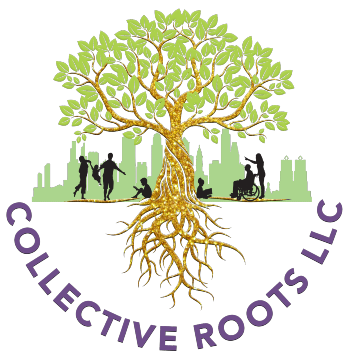
Workshops
Whats on the menu
Collective Roots, LLC supports helping professionals by equipping them with skills and tools to more effectively serve our communities, while also caring for themselves.
Training & Workshops
Support is always here for you!
Collective Roots, LLC offers several trainings under the topic of Trauma Informed Practices. These workshops can be altered (content and length) to fit your organization's needs.
Understanding Trauma and its Impact: (3 hours)
This workshop focuses on what trauma is and who is affected; how the brain and body respond to stress and threat; the impact of exposure to trauma; and how environments (schools, social service agencies, community programs) are affected by trauma.
Learning Objectives:
Participants will develop an awareness and understanding of the prevalence and impact of trauma and implications for helping professionals.
Creating Trauma Sensitive Environments: (3 hours)
The foundation for this training is the 6 guiding principles to a trauma informed approach. The facilitator will introduce workshop attendees to the concept of trauma sensitivity and provide examples of trauma-sensitive practices that can be adopted in various spaces. In a trauma-sensitive environment, all staff share a common understanding of trauma and its impact on youth, families, and staff and they commit to a joint mission to create environments that acknowledge and address the effects of trauma on a child’s success.
Learning Objectives:
The 3 E’s and 4 R’s of Trauma: (90 minutes)
An abbreviated workshop that summarizes trauma and trauma informed care. This training is best used as a refresher course or as an introduction training to trauma.
Learning Objectives:
Mindfulness: Improving Self-Regulation (90 minutes)
Mindfulness as a concept is defined and explored. Mindfulness practices help children and adolescents improve their ability to self regulate (control their behavior, emotions, and thoughts) and focus. Mindfulness also provides kids (and the adults supporting them) with skills for understanding their emotions and how to work with them.
Learning Objectives:
Understanding Gender and the Gender Spectrum (2 hours)
There is a lot more to being male, female, or any gender than the sex assigned at birth. Your biological or assigned sex does not always tell your complete story.It’s common for people to confuse sex, gender, and gender identity, but they are actually all different things. Understandings of gender continually evolve. In the course of a person’s life, the interests, activities, clothing and professions that are considered the domain of one gender or another evolve in ways both small and large. This has perhaps never been more true than it is now. This training will focus on the gender spectrum and support attendees in developing an understanding of gender inclusiveness. Gender inclusiveness and diversity allows us to be more informed and supportive.
Learning Objectives:
Racial Stress and Self Care: Taking Our Power Back (2 hours)
Racial stress is defined and discussed through the lens of Physiological, Psychological and Socio-Political Effects. The facilitator will dissect how racial stress impacts social service providers and the work they accomplish with their consumers. Participants will develop a short action plan to promote well-being and address racial stress in their own lives.
Learning Objectives:
Creating Behavior Change with Motivational Interviewing (2 hours)
MI is a tool that professionals can use to elicit behavior change from the population they serve.Young people often exhibit challenging or resistant behaviors. Knowing that all behavior is purposeful and serves to meet a need, what can we learn if we listen? By listening correctly we can identify needs that our young people have. We can intervene, with a structured framework, and teach students more constructive ways to meet their needs.
Learning Objectives:
ADHD or Child Traumatic Stress
If you work with children you have most certainly had to deal with behavior that was viewed as concerning or abnormal. It has become increasingly common for children displaying abnormal behavior to be diagnosed with various mental health or behavioral diagnosis, such as ADHD. In the past 20 years the rate of ADHD diagnosis has increased significantly. Experts allege that many of the new cases of ADHD are actually instances of misdiagnosis. This training will support professionals in developing skills to identify the cause of behavior and determine appropriate interventions.
Learning Objectives:
Student Athletes: The Impact of Stress on their Mental Health (2 hours)
Culture is constantly changing and developing, creating an ebb and flow effect on the mental and emotional well being of today’s student athletes. The daily expectations for student athletes creates pressure that can greatly influence intense emotional responses. The time, energy and training dedicated to developing skills in a sport can lead to an imbalance in other areas of the student athlete's life. Developmental predisposition and environmental influence shape emotional, motor and social aspects of the brain.This training will explore stressors specific to the student athlete and inform practitioners of interventions to support well-being and growth in the student athlete.
Learning Objectives:
Collective Roots LLC offers the trainings below to meet our communities need for growth in the area of cultural competence. Please visit this list often as we expect to expand trainings offered in this area.
Inclusive Language: Talking About LGBTQ People & Equality (2 hours)
The words we use to talk about lesbian, gay, bisexual, transgender and queer people can have a powerful impact on our conversations and the exploration of issues . The right words can help open people’s hearts and minds, while others can create distance or confusion. It’s beneficial to offer an overview of essential vocabulary, terms to avoid, and a few key messages for talking about various issues.
Learning Objectives:
